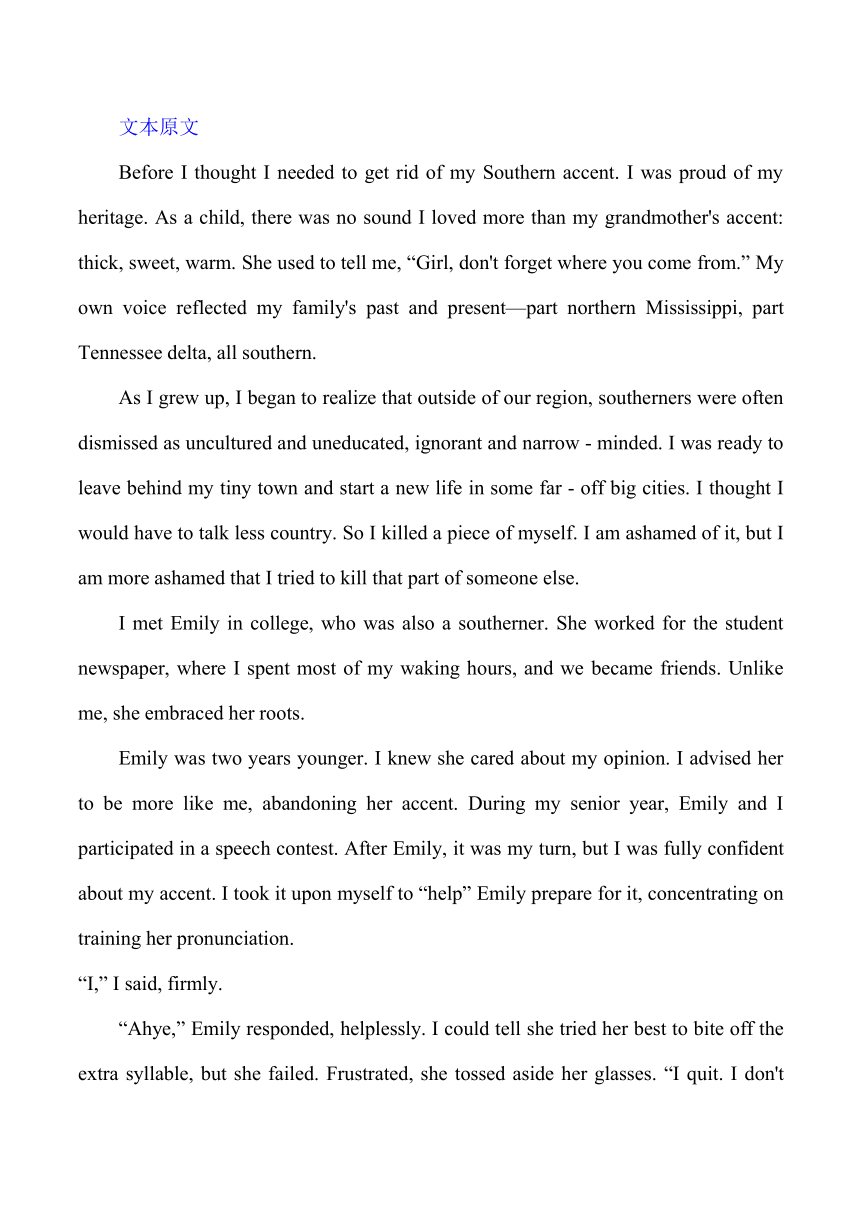
文本原文 Before I thought I needed to get rid of my Southern accent. I was proud of my heritage. As a child, there was no sound I loved more than my grandmother's accent: thick, sweet, warm. She used to tell me, “Girl, don't forget where you come from.” My own voice reflected my family's past and present—part northern Mississippi, part Tennessee delta, all southern. As I grew up, I began to realize that outside of our region, southerners were often dismissed as uncultured and uneducated, ignorant and narrow - minded. I was ready to leave behind my tiny town and start a new life in some far - off big cities. I thought I would have to talk less country. So I killed a piece of myself. I am ashamed of it, but I am more ashamed that I tried to kill that part of someone else. I met Emily in college, who was also a southerner. She worked for the student newspaper, where I spent most of my waking hours, and we became friends. Unlike me, she embraced her roots. Emily was two years younger. I knew she cared about my opinion. I advised her to be more like me, abandoning her accent. During my senior year, Emily and I participated in a speech contest. After Emily, it was my turn, but I was fully confident about my accent. I took it upon myself to “help” Emily prepare for it, concentrating on training her pronunciation. “I,” I said, firmly. “Ahye,” Emily responded, helplessly. I could tell she tried her best to bite off the extra syllable, but she failed. Frustrated, she tossed aside her glasses. “I quit. I don't think I have to get rid of my accent for the presentation. If they want to laugh, so be it!” I had told myself I was helping her. Now I was not sure. 注意: (1) 续写词数应为 150 个左右; (2) 请按如下格式在答题卡的相应位置作答。 Then came the day when Emily delivered her speech._____ Suddenly, my grandmother's words hit me._____ 续写分析 1. 主旨 文章主要探讨了地域口音与个人身份认同之间的关系。主人公在成长过程中,因外界对南方口音的偏见而试图摒弃自己的南方口音,但在试图帮助朋友改变口音时,引发了对自我身份认同的重新思考,传达了对自身文化根源应有的尊重和珍视这一主题。 2. 情节 童年与家乡的联系 主人公小时候以自己的南方血统为傲,喜欢祖母那带有浓厚南方特色的口音,这种口音象征着家族的历史和地域文化。 成长中的观念转变 随着年龄增长,主人公意识到外界对南方人存在刻板印象,认为他们没文化、思想狭隘。为了在大城市开启新生活,主人公决定改变自己的口音,压抑自己的一部分身份特征。 大学与朋友的故事 在大学遇到同为南方人的 Emily,她与主人公不同,欣然接受自己的南方根。在一次演讲比赛中,主人公出于自认为的 “帮助”,试图纠正 Emily 的口音,结果却让 Emily 感到挫败和反感。 3. 人物感情 主人公 童年的骄傲:小时候对南方口音和家族根源感到自豪,体现了对家乡文化纯真的喜爱。 成长后的矛盾与羞愧:一方面因外界偏见而想摆脱南方口音,另一方面又对自己试图摒弃自身文化特征的行为感到羞愧,内心存在着自我认同的冲突。 对朋友的复杂情感:在帮助 Emily 纠正口音时,主人公出发点是自认为的 “好意”,但这种 “帮助” 实则反映了主人公内心深处对南方口音的不接纳,当 Emily 拒绝改变时,主人公开始对自己的行 ... ...
~~ 您好,已阅读到文档的结尾了 ~~

